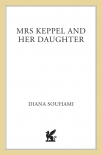Mrs. Keppel and Her Daughter, Diana Souhami [the ebook reader TXT] 📗

- Author: Diana Souhami
Book online «Mrs. Keppel and Her Daughter, Diana Souhami [the ebook reader TXT] 📗». Author Diana Souhami
At the end of October 1939 she went to London ‘for a consultation’ with her bank manager. ‘I am afraid there will be endless complications … I may have to leave England.’ She needed to get to her accounts in Monte Carlo and Florence. War was a hectic worry, a financial drain, a chaos of displacement, a cruel contrast to the delights of past times.
At Sissinghurst Vita flew the Sackville flag, ‘a dream of gaiety and garishness’. Harold in his daily letters wrote to her of the politics of invasion. ‘What fiends are loose over this earth.’ She wrote to him of the moon, swans and subsidies on ploughing and feared she must appear ‘dull and rustic’ in his eyes. She wondered how she would feel if all her male relations were wiped out and she were to succeed to Knole:
Would I be happy giving up Sissinghurst for Knole? I broke my heart once and for all over Knole and finished with that …
How I wish Dr Freud had never existed to explain our deepest feelings to us.
‘My word!! The budget!!’ Harold wrote to her at the end of September. Income tax was raised to ten shillings in the pound. The House, he said, ‘gave one long gasp’ when it heard. ‘My darling we must discuss our finances. I fear that life is not going to be easy.’
At the end of April 1940 Mrs Keppel and George were at the Hôtel de Paris, Monte Carlo. She had been to the Ombrellino, put treasures into store, seen her bank managers. She hoped to go back there – her luggage had been packed for a fortnight – but the news was ‘worse and worse’. She heard a swastika had been hoisted over the villa and she was ‘taking advice’ from the British Consul: ‘the Consul here is charming & so kind’. George was not coping:
Papa’s temper is beyond words’ I think his spots make him much worse, & I am sure mine is not too good. If only he could make some friends but he wont or cant …
all this worry has made him very very ill … his heart is very very tired and his nerves are completely out of hand. He is having Bromide to try to calm him now, but it’s very sad to see him like this, covered wih rash and furious with everyone … his kidneys have gone wrong too.
She was, she said on 11 April, longing to see Violet. ‘I can’t bear to think of you in Paris and I here.’
Violet was having trouble with her teeth, which had loosened in her gums. As the prospect of German invasion drew near she closed St Loup, left her silver with the Duc d’Harcourt, and in a car marked with the Red Cross travelled with her friend the Princesse Gilone de Chimay to the safety of the Princess’s chateau in the Dordogne. ‘Never shall I forget the exodus from Paris,’ she wrote with embellishment, ‘the terrified scrutiny of the skies … the wild-eyed refugees … the swaying, stinking camions…’
Her plan was to meet with Mother so that together they could escape to freedom. On 20 April Mrs Keppel got three telegrams from her. She replied to her at Gilone de Chimay’s house, told her it would be a joy to see her, not to bring much luggage and to watch what she spent:
This hotel is so fearfully expensive – £600 in six weeks, so sweetie you will have to try & be very careful here. You left a bill (unpaid) in the bar & owed that beastly Nigger some francs!!
Over the next six weeks the Germans took Boulogne, Ypres, Lille, Paris. Italy declared war on Britain and France, Hitler threatened total annihilation of his enemies. Mrs Keppel again found protection from the British Consul and officials in Biarritz, Violet dashed around acquiring visas for Spain and Portugal with the thought of getting a boat for England there.
They made their exodus in July 1940 in a Royal Navy troop ship from St Jean de Luz. Places that echoed with memories of regal adultery and disastrous matrimony for La Favorita and the ill-favoured Lushka were ports of passage for mother and daughter, both adventurers, whose romantic days were done. Politics had rushed like a tide into their lives, taken their houses, riches, freedom, friends and forced them literally into the same boat.
They were three days docked in the harbour while soldiers and British nationals crammed on board. Violet gave her bag of jewels to someone she supposed to be a porter. Mrs Keppel was the only passenger to be given a cabin. Privilege and status are relative concepts and wherever she went she was something of a queen. Each morning from the engine room she collected a jug of hot water for her wash and George’s shave. Violet was afraid of submarines, torpedoes, bombs and the Gestapo and vexed by a shortage of good food, privacy and cigarettes. After an arduous journey they arrived unharmed on England’s shores with a story to embroider. At Polesden Lacey Mrs Greville remarked, ‘To hear Alice talk about her escape from France, one would think she had swum the Channel with her maid between her teeth.’
NINETEEN
They repaired to Mrs Keppel’s spiritual home. During the war years she became known as ‘Empress of the Ritz’. She presided in the Edwardian lounge with an ‘aura of grandeur … far more regal than the poor Queen of Albania’. Sometimes her audience wondered quite which war she was in. She divulged the latest gossip, professed intimacy with the Prime Minister and the Secretary of State for





Comments (0)